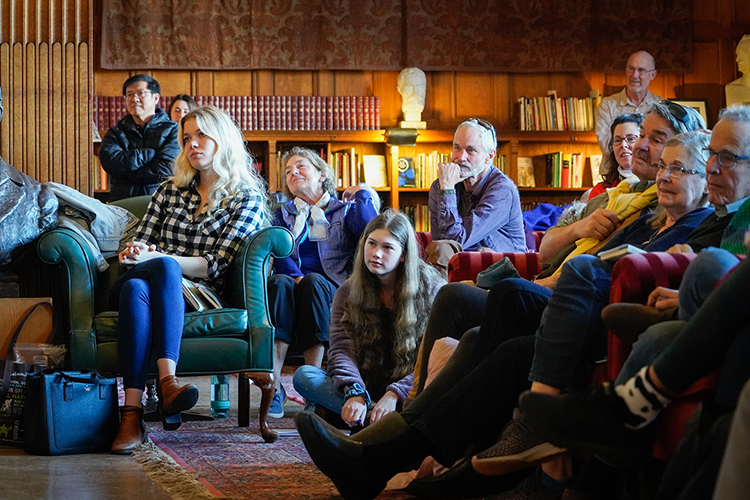In arts and humanities at UC Berkeley, a blend of old and new
The humanities must play an important role at any major research university

February 28, 2023
. (UC Berkeley video)
At UC Berkeley’s Arts & Humanities Division, which encompasses 19 departments and 14 research units, more students are choosing humanities majors from programs that are consistently ranked as the best in the country.
Sara Guyer, the Irving and Jean Stone Dean of the Division of Arts & Humanities and professor of English, and Stephen Best, director of the Townsend Center for the Humanities and Marian E. Koshland Distinguished Professor of English, discussed on Monday the present and future of arts and humanities at Berkeley in the semester’s first Campus Conversations event.
“There’s enormous interest in the humanities,” Guyer said. “That led me to ask why — some things have changed in the lives of our students, and some things have changed in the lives of our departments. Many students are looking to make sense of what they’ve gone through — not just empirically, but also in their imagination.”
“One of the things you’re coming to college trying to understand is what is this world that’s yours, and how are you going to live in it? What decisions are you going to make, and why are those the right decisions to make? There’s nowhere else in the university focused on questions of ethics, imagination, what it is to be human in this world than the arts and humanities.”
Berkeley stands out because of its ability to balance both old and new traditions in the humanities, Guyer said.
“What is most unusual about Berkeley is its commitment to the traditional, the core, the fundamental areas of the humanities, and also to completely breaking that open and doing new things,” Guyer said. “I think that’s why students are so excited — they have both the grounding in a historic tradition and the opportunity to ask new questions about their lives and the world they want to live in.”
Moving forward, the goal is to provide students with access to a narrative about the value of the humanities for themselves as individuals, as students, but also for society. “It’s actually grounds for a successful career,” said Guyer.
Best’s goals for the Townsend Center focus around helping colleagues to reconstitute the sense of intellectual community on campus.
One of those partnerships will be with Berkeley’s Center for New Media, to explore artificial intelligence (AI) and the humanities. The two centers are planning an event that will feature scholars alongside engineers, both discussing the challenges and opportunities for language translation. Both Guyer and Best discussed the role and relationship of AI and the humanities.
“It’s not about is this good for us or is this bad for us; it’s about formulating a series of critical questions so that we know how to negotiate our relationship with these new tools,” Best said. “Learning how to contextualize AI’s social impacts. Learning how to consider the racial implications of automated algorithmic responses. It’s trying to think critically.”
Ultimately, Guyer said, the humanities must play an important role at any major research university.
“What the humanities allow us is to be in complexity,” said Guyer. “Questions we might never answer in our own times, we are going to ask the hardest questions with the understanding that we might never know the answers. It’s about the shared complexity of our world.”